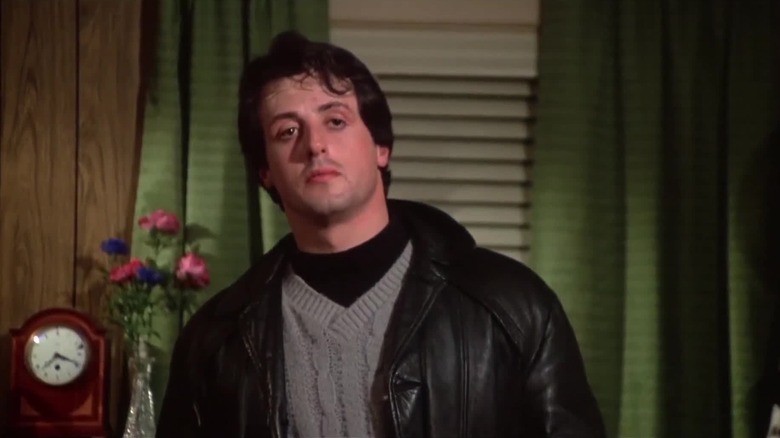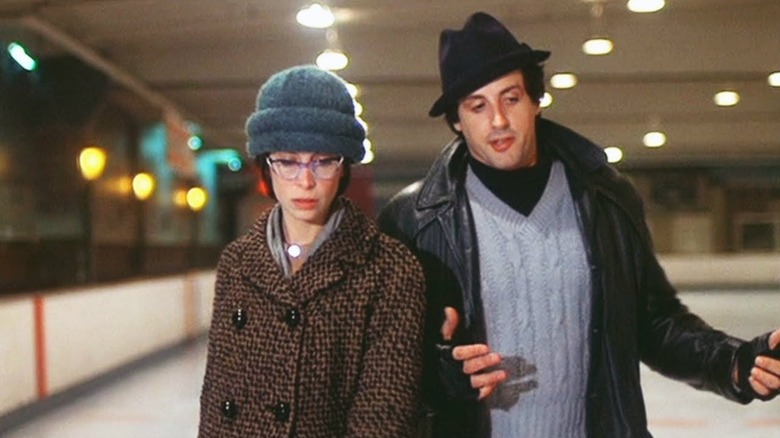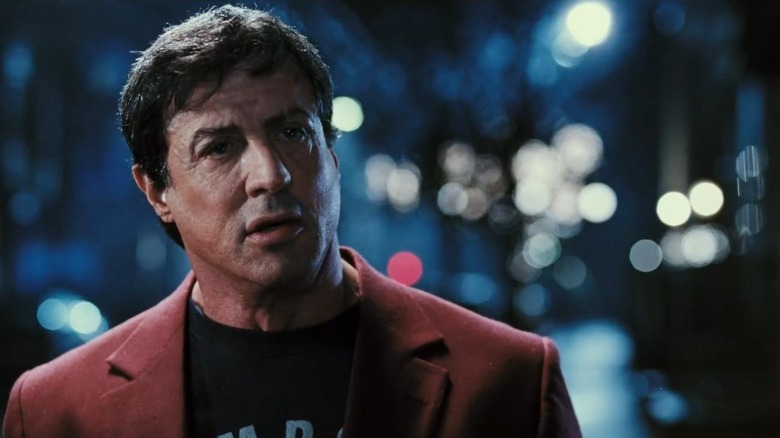Sylvester Stallone Knows Exactly Why Rocky Was Such A Big Hit
The 1970s were a tumultuous time in the United States. Whether you look at political scandals like Watergate, the fallout of the Vietnam War, and severe economic unrest, Americans were feeling quite cynical. Given the vibes in the country at the time, much of what cinema brought reflected the moral ambiguity and raw grit that was fresh on the minds of viewers at the time. Films such as "The Godfather" and "Taxi Driver" are a showcase of some of New Hollywood's rising filmmakers, whose creative sensibilities influenced cinema for generations, and helped reflect the collective cynicism of the American people in that decade. You can read /Film's ranking of the 15 best films of the 1970s here.
However, the audience's cinematic tastes started to evolve thanks to the release of "Jaws" in 1975. Steven Spielberg's film became an unprecedented cultural phenomenon and popularized the modern blockbuster for cinema. Audiences were eager to be thoroughly entertained in their visits to the movie theater, and their appetite for more inspiring crowd-pleasing films continued throughout the decade, thanks to films such as "Star Wars," "Superman: The Movie," and "Rocky." While "Rocky" may be a smaller-budget sports film compared to the epic scale of the other blockbusters mentioned, the 1976 release, which was written by its then-unknown leading man, Sylvester Stallone, inspired audiences with its compelling underdog story. The film became the highest-grossing film of 1976 and won three Academy Awards, including Best Picture.
Sylvester Stallone believes audiences yearned for inspiring characters like Rocky Balboa
Before "Rocky" was produced, Sylvester Stallone was living the typical working actor's life, struggling in his career, and hustling endlessly. He wrote the film's script, which in some ways, reflected his desires to be given a chance in the spotlight to potentially lead to a more fulfilling career. Stallone's earnestness and authenticity were on full display in his script and lead performance, which charmed critics and audiences alike.
In a 2012 interview with Roger Ebert, Sylvester Stallone reflected on his career, particularly in how "Rocky" changed his life and turned him into one of Hollywood's biggest stars, even if it became a bit of a double-edged sword for him. When looking back on his original film, Stallone has a clear understanding of why audiences gravitated towards the eccentric, yet sweet Philadelphia boxer, and how easy it is to empathize and root for the underdog:
"The people like it who let their emotions be their guide. Of course, if you go in intellectually, you hate it. But if you let yourself go with it, something happens about 40 minutes into the movie. You say to yourself, hey, this isn't going to be the colossal downer of all time. You find out Rocky's not just a fighter on the way down, he's a pliable, vulnerable person. And the movie isn't just about fighting it's about heart and love. And then you throw yourself into it emotionally. Maybe that's why I made it about boxing. Everybody knows what it's like to punch, and be punched, and everybody knows what it's like to fall in love."
Although the Rocky franchise became campy, the raw humanity of the character stays true
Following the critical and commercial success of "Rocky," Sylvester Stallone returned for five more films in the series. He wrote and directed "Rocky II," "Rocky III," "Rocky IV," and "Rocky Balboa," while John G. Avildsen returned to direct "Rocky V," which Stallone also wrote, despite his public disdain for the film. "Rocky II" took place immediately after the first film and continues the thread of raw human emotions for the character on a moderately expanded scale. "Rocky III" was when the series began to get campy, thanks to the larger-than-life opponents taking the spotlight, reflecting the exaggerated bravado of 1980s popular culture. Villains like Clubber Lang (Mr. T) and Ivan Drago (Dolph Lundgren) were particularly memorable and challenged Rocky physically, mentally, and emotionally.
Although the "Rocky" series had its share of camp, its earnestness and heart are maintained throughout its entire legacy. It helps that Sylvester Stallone is supported by wonderful actors who help ground the stories in reality. After all, Rocky's unconditional love for his wife, Adrian (Talia Shire), is the heart of the entire series, even when it is revealed she passed away from cancer before the events of the underrated "Rocky Balboa." The tenderness of Rocky continues in the "Creed" films, where he fully embraces the role of mentor for Adonis Creed (Michael B. Jordan), the son of his former rival turned friend, Apollo Creed (Carl Weathers).


